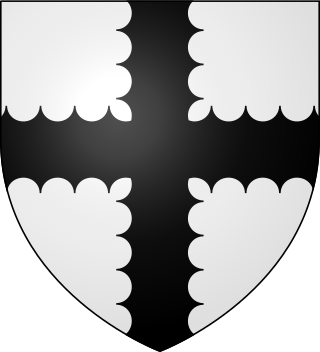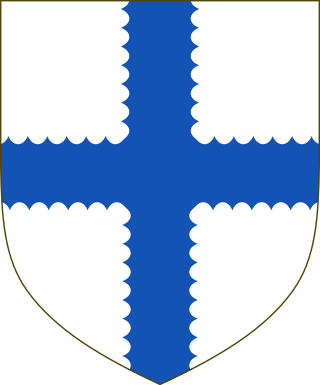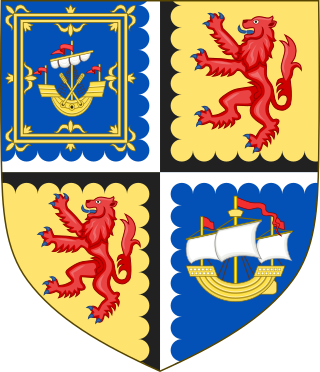Related Research Articles

Henry I Sinclair, Earl of Orkney, Lord of Roslin was a Scottish nobleman. Sinclair held the title Earl of Orkney and was Lord High Admiral of Scotland under the King of Scotland. He was sometimes identified by another spelling of his surname, St. Clair. He was the grandfather of William Sinclair, 1st Earl of Caithness, the builder of Rosslyn Chapel. He is best known today because of a modern legend that he took part in explorations of Greenland and North America almost 100 years before Christopher Columbus. William Thomson, in his book The New History of Orkney, wrote: "It has been Earl Henry's singular fate to enjoy an ever-expanding posthumous reputation which has very little to do with anything he achieved in his lifetime."
William Sinclair (1410–1480), 1st Earl of Caithness (1455–1476), last Earl (Jarl) of Orkney, 2nd Lord Sinclair and 11th Baron of Roslin was a Norwegian and Scottish nobleman and the builder of Rosslyn Chapel, in Midlothian.

Lord Sinclair is a title in the Peerage of Scotland. According to James Balfour Paul's The Scots Peerage, volume VII published in 1910, the first person to be styled Lord Sinclair was William Sinclair, 3rd Earl of Orkney and 1st Earl of Caithness. However, according to Roland Saint-Clair writing in the late 19th century, William Sinclair's father, Henry II Sinclair, Earl of Orkney, who died in 1420, is the first person recorded as Lord Sinclair by public records.

Clan Sutherland also known as House of Sutherland is a Highland Scottish clan whose traditional territory is the shire of Sutherland in the far north of Scotland. The chief of the clan was also the powerful Earl of Sutherland; however, in the early 16th century, this title passed through marriage to a younger son of the chief of Clan Gordon. The current chief is Alistair Sutherland, who holds the title Earl of Sutherland.

Clan Sinclair is a Highland Scottish clan which holds the lands of Caithness, the Orkney Islands, and the Lothians. The chiefs of the clan were the Barons of Roslin and later the Earls of Orkney and Earls of Caithness.

Archibald Douglas, Earl of Douglas and Wigtown, Lord of Galloway, Douglas and Bothwell, called Archibald the Grim or Black Archibald, was a late medieval Scottish nobleman. Archibald was the illegitimate son of Sir James "the Black" Douglas, Robert the Bruce's trusted lieutenant, and an unknown mother. A first cousin of William Douglas, 1st Earl of Douglas, he inherited the earldom of Douglas and its entailed estates as the third earl following the death without legitimate issue of James, 2nd Earl of Douglas at the Battle of Otterburn.
Henry II Sinclair, Earl of Orkney was the Jarl (Earl) of Orkney, Baron of Roslin and Pantler of Scotland. According to Roland Saint-Clair writing in the late 19th century, Henry Sinclair was also the first of his family to hold the title of Lord Sinclair.

Baron of Roslin or Rosslyn was a Scottish feudal barony held by the St Clair or Sinclair family.

Sir Henry St Clair was a 13th- and 14th-century Scottish noble, who was the 7th Baron of Roslin and Lord of Catcune.

George Sinclair was a Scottish nobleman, the 4th Earl of Caithness and chief of the Clan Sinclair, a Scottish clan of the Scottish Highlands.

William St. Clair, 6th Baron of Roslin was a Scottish nobleman of the late 13th century.

William Sinclair of Newburgh, Aberdeenshire was a Scottish nobleman and the 3rd Lord Sinclair. In The Scots Peerage by James Balfour Paul he is designated as the 2nd Lord Sinclair, but historian Roland Saint-Clair designates him the 3rd Lord Sinclair in reference to his descent from his grandfather, Henry II Sinclair, Earl of Orkney, the first Lord Sinclair. Roland Saint-Clair references this to an Act of the Scottish Parliament in which William Sinclair's son, Henry Sinclair, 4th Lord Sinclair, was made Lord Sinclair based on his descent from his great-grandfather, Henry II Sinclair, Earl of Orkney, the first Lord Sinclair. Bernard Burke, in his a Genealogical and Heraldic Dictionary of the Peerage and Baronetage of the British Empire, agrees with Roland Saint-Clair and says that Henry Sinclair was "in reality" the fourth holder of the title of Lord Sinclair.

William St Clair was a Scottish noble and by tradition the 8th Baron of Roslin.

Henry Sinclair was a Scottish noble and the 4th Lord Sinclair. In The Scots Peerage by James Balfour Paul he is designated as the 3rd Lord Sinclair, but historian Roland Saint-Clair designates him the 4th Lord Sinclair and references this to an Act of the Scottish Parliament in which he was made Lord Sinclair based on his descent from his great-grandfather, Henry II Sinclair, Earl of Orkney, the first Lord Sinclair. Bernard Burke, in his a Genealogical and Heraldic Dictionary of the Peerage and Baronetage of the British Empire, agrees with Roland Saint-Clair and says that Henry Sinclair was "in reality" the fourth holder of the title of Lord Sinclair.

William Sinclair was a Scottish nobleman and the 5th Lord Sinclair. In The Scots Peerage by James Balfour Paul he is designated as the 4th Lord Sinclair in descent starting from William Sinclair, 1st Earl of Caithness and 3rd Earl of Orkney, but historian Roland Saint-Clair designates him as the 5th Lord Sinclair in descent from the father of the 1st Earl of Caithness and 3rd Earl of Orkney, Henry II Sinclair, Earl of Orkney, who is the first person recorded as Lord Sinclair in public records. Roland Saint-Clair references this to an Act of the Scottish Parliament in which the 4th Lord Sinclair was made Lord Sinclair based on his descent from his great-grandfather, Henry II Sinclair, Earl of Orkney, the first Lord Sinclair. Bernard Burke, in his a Genealogical and Heraldic Dictionary of the Peerage and Baronetage of the British Empire, agrees with Roland Saint-Clair and says that William Sinclair was "in reality" the fifth Lord Sinclair.
Henry St Clair, Lord Herdmanston and Carfrae, was a Scottish noble of the 12th century.

Patrick Sinclair was a Scottish nobleman and the 9th Lord Sinclair. In The Scots Peerage by James Balfour Paul he is designated as the 8th Lord Sinclair in descent starting from William Sinclair, 1st Earl of Caithness and 3rd Earl of Orkney, but historian Roland Saint-Clair designates him as the 9th Lord Sinclair in descent from the father of the 1st Earl of Caithness and 3rd Earl of Orkney, Henry II Sinclair, Earl of Orkney, who is the first person recorded as Lord Sinclair in public records. Roland Saint-Clair references this to an Act of the Scottish Parliament in which the 4th Lord Sinclair was made Lord Sinclair based on his descent from his great-grandfather, Henry II Sinclair, Earl of Orkney, the first Lord Sinclair. Bernard Burke, in his a Genealogical and Heraldic Dictionary of the Peerage and Baronetage of the British Empire, agrees with the numbering by Roland Saint-Clair and says that Henry Sinclair and William Sinclair were "in reality" the fourth and fifth Lords Sinclair respectively.

John Sinclair was a Scottish nobleman and the 10th Lord Sinclair. In The Scots Peerage by James Balfour Paul he is designated as the 9th Lord Sinclair in descent starting from William Sinclair, 1st Earl of Caithness and 3rd Earl of Orkney, but historian Roland Saint-Clair designates him as the 10th Lord Sinclair in descent from the father of the 1st Earl of Caithness and 3rd Earl of Orkney, Henry II Sinclair, Earl of Orkney, who is the first person recorded as Lord Sinclair in public records. Roland Saint-Clair references this to an Act of the Scottish Parliament in which the 4th Lord Sinclair was made Lord Sinclair based on his descent from his great-grandfather, Henry II Sinclair, Earl of Orkney, the first Lord Sinclair. Bernard Burke, in his a Genealogical and Heraldic Dictionary of the Peerage and Baronetage of the British Empire, agrees with the numbering by Roland Saint-Clair and says that Henry Sinclair and William Sinclair were "in reality" the fourth and fifth Lords Sinclair respectively.

Lord Herdmanston was a title in the Peerage of Scotland that was held by the Sinclair or St Clair family.
References
Sources
- Balfour Paul, Sir James, Scots Peerage IX vols. Edinburgh 1905.
- Fraser, Sir William. The Douglas Book 4 vols, Edinburgh, 1885.
- Grose, Francis, The Antiquities of Scotland Vol II. London 1791.